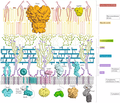Mycobacterium
Mycobacterium is a genus of Actinobacteria, given its own family, the Mycobacteriaceae. The genus includes pathogens known to cause serious diseases in mammals, including tuberculosis (Mycobacterium tuberculosis) and leprosy (Mycobacterium leprae). The Greek prefix myco- means "fungus," alluding to the way mycobacteria have been observed to grow in a mold-like fashion on the surface of cultures. It is acid-fast and has an unusually high lipid content.
Characteristics[edit]
Mycobacteria are aerobic and nonmotile bacteria (except for the species Mycobacterium marinum, which has been shown to be motile within macrophages) that are characteristically acid-alcohol fast. Mycobacteria have an outer membrane lipid bilayer. If a Gram stain is performed, they will stain very weakly Gram-positive or may not retain dye due to the high lipid and mycolic acid content of their cell walls.
Pathogenesis[edit]
Mycobacteria can colonize their hosts without the hosts showing any adverse signs. For example, billions of humans around the world are infected with Mycobacterium tuberculosis, but have no symptoms due to it being a latent infection. The host's immune system is unable to completely clear the organism, and the bacteria can survive in a dormant state within the host for years.
Species[edit]
There are over 150 recognized species of Mycobacterium, some of which are pathogenic. The best known pathogenic species are M. tuberculosis and M. leprae. Other known pathogenic species include M. avium and M. bovis.
Treatment[edit]
Treatment varies by the species of Mycobacterium involved. For example, M. tuberculosis is typically treated with a regimen of multiple antibiotics to reduce the risk of the bacteria developing antibiotic resistance. M. leprae is also treated with a combination of antibiotics.
See also[edit]
|
|
|
-
Mycobacterium tuberculosis 01
-
Model of the Mycobacterial Cell Envelope
-
Three Pathogenic Mycobacteria
-
Phylogenetic Tree of Slowly-Growing Mycobacterium Tortoli 2017
-
Phylogenetic Tree of Rapidly-Growing Mycobacterium Tortoli 2017
-
Mycobacterium tuberculosis Ziehl-Neelsen stain 02
-
Slant tubes of Löwenstein-Jensen medium with control, M tuberculosis, M avium and M gordonae
-
Mycobacteria Growth Indicator Tube (MGIT) samples in ultraviolet light
Ad. Transform your life with W8MD's Budget GLP-1 injections from $49.99


W8MD offers a medical weight loss program to lose weight in Philadelphia. Our physician-supervised medical weight loss provides:
- Weight loss injections in NYC (generic and brand names):
- Zepbound / Mounjaro, Wegovy / Ozempic, Saxenda
- Most insurances accepted or discounted self-pay rates. We will obtain insurance prior authorizations if needed.
- Generic GLP1 weight loss injections from $49.99 for the starting dose of Semaglutide and $65.00 for Tirzepatide.
- Also offer prescription weight loss medications including Phentermine, Qsymia, Diethylpropion, Contrave etc.
NYC weight loss doctor appointmentsNYC weight loss doctor appointments
Start your NYC weight loss journey today at our NYC medical weight loss and Philadelphia medical weight loss clinics.
- Call 718-946-5500 to lose weight in NYC or for medical weight loss in Philadelphia 215-676-2334.
- Tags:NYC medical weight loss, Philadelphia lose weight Zepbound NYC, Budget GLP1 weight loss injections, Wegovy Philadelphia, Wegovy NYC, Philadelphia medical weight loss, Brookly weight loss and Wegovy NYC
|
WikiMD's Wellness Encyclopedia |
| Let Food Be Thy Medicine Medicine Thy Food - Hippocrates |
Medical Disclaimer: WikiMD is not a substitute for professional medical advice. The information on WikiMD is provided as an information resource only, may be incorrect, outdated or misleading, and is not to be used or relied on for any diagnostic or treatment purposes. Please consult your health care provider before making any healthcare decisions or for guidance about a specific medical condition. WikiMD expressly disclaims responsibility, and shall have no liability, for any damages, loss, injury, or liability whatsoever suffered as a result of your reliance on the information contained in this site. By visiting this site you agree to the foregoing terms and conditions, which may from time to time be changed or supplemented by WikiMD. If you do not agree to the foregoing terms and conditions, you should not enter or use this site. See full disclaimer.
Credits:Most images are courtesy of Wikimedia commons, and templates, categories Wikipedia, licensed under CC BY SA or similar.
Translate this page: - East Asian
中文,
日本,
한국어,
South Asian
हिन्दी,
தமிழ்,
తెలుగు,
Urdu,
ಕನ್ನಡ,
Southeast Asian
Indonesian,
Vietnamese,
Thai,
မြန်မာဘာသာ,
বাংলা
European
español,
Deutsch,
français,
Greek,
português do Brasil,
polski,
română,
русский,
Nederlands,
norsk,
svenska,
suomi,
Italian
Middle Eastern & African
عربى,
Turkish,
Persian,
Hebrew,
Afrikaans,
isiZulu,
Kiswahili,
Other
Bulgarian,
Hungarian,
Czech,
Swedish,
മലയാളം,
मराठी,
ਪੰਜਾਬੀ,
ગુજરાતી,
Portuguese,
Ukrainian










